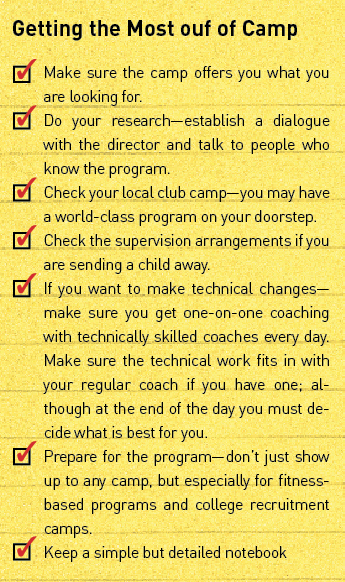By Richard Millman, Director of Squash, Kiawah Island Club
Continuing with last month’s introduction to summer squash camps, here are a few more great reasons to go camping.
If court time and practice are more your priority, choose a program where there are people of your own level to play with and where there is enough court space to practice. Four to a court is fine, but more than that and your practice time will be limited. In this situation the coach to student ratio isn’t quite so important as long as the coaches aren’t trying to deliver detailed technical coaching. Tips (whether technical or strategic) are fine as a reminder of something to work on when you do have a one-on-one technical session with your regular coach, but unless you are going to work intensively on the idea mentioned for several hours/days, this should not be a major focus of a program where practice and court time are the major goals. If the coach does give you a useful tip, make sure you have your notebook handy and write it down—otherwise you won’t remember and won’t benefit. If you don’t understand the tip fully, write it down at the time and see the coach afterwards to get clarification.
 If seeing a college or coach is your priority, make sure you have prepared thoroughly before you get to camp. To make a good impression you need to arrive in shape, having been practicing regularly, with a real team spirit and a genuine knowledge and interest in the college and its program.
If seeing a college or coach is your priority, make sure you have prepared thoroughly before you get to camp. To make a good impression you need to arrive in shape, having been practicing regularly, with a real team spirit and a genuine knowledge and interest in the college and its program.
If doing something together as a family or group is what you are after, make sure the location of the camp offers plenty of activities and amenities when you are not on court. Look for programs in beautiful and/or entertaining places where you will get both your squash and either the beach or mountains or golf, great food, and evening entertainment. Look for an entertaining coaching staff who can make things fun for all of you and who will make you feel like part of the family and club for the duration of your stay. If you don’t see a program advertised, decide where you would like to go and contact the local coach. If he or she is anything like me, they will probably love organizing an ad hoc program.
In summary, camp can be many things to many people and frequently more than one thing. Here is a checklist of how to get the most out of your camp experience.
Finally, what about after camp? What should your expectations be? I mentioned earlier that technical improvements take at least 10-12 weeks to become an automated part of your game. The same is usually true of any major change you are trying to make in your game. In business a common rule of thumb is that a behavior has to be repeated at least 30 times before it can start becoming a habit, and that’s in a world where you aren’t faced with an opponent that’s putting you under constant pressure and doing everything they can to distract you and stop you.
So here’s my rule for what to expect from your camp experience in terms of tangible improvement. Chart the areas you are working on. Keep weekly and monthly records and comparisons of the behavior or skill you are trying to improve. If you take a week of camp in July or August, and you are prepared to diligently follow up and work on the new skill or behavior, expect to see a serious improvement in your game by late January or February. So about 20 weeks from start of change to a clear improvement in your game (not to be confused with the 10-12 weeks it takes to automate the new skill—then you need time to become familiar with how to make it fit in beneficially in your match play). So March/April—will give improvement in August/September. If you see something before that long, then that’s a bonus. This may seem like a long time, but if you were able to leap up the rankings even five places as a result of a camp program, you could change from being a player that was ranked in the 50’s to a player ranked in the 30’s in four camps—or 20 places in 20 months. And if you leaped more than five at a time, even more. Provided you followed up diligently. Camp and camp coaches can only help you—you have to do the follow-up work if you want the results.
If you don’t see anything and you have followed up diligently, then perhaps that program didn’t help you improve. Of course you may still have had a wonderful time and if that was your motivation—then great!
Camp can and should be a memorable experience. It should fulfill the goals you set for yourself. Remember, it can be absolutely exhausting and campers may not want to spend time talking about the camp immediately afterwards. After you have worked that hard and your brain is starting on the 10-12 week follow-up process, you may just want to chill! If you are a parent of a camper, try not to launch the Spanish Inquisition when your camper comes home. Let the story come out as and how your camper wants to let you know. After a short period of relaxation start the follow-up program and, pretty soon, you’ll see some amazing results!
For a list of things to take to camp, visit www.SquashMagazine.com. There is a complete checklist for you.





